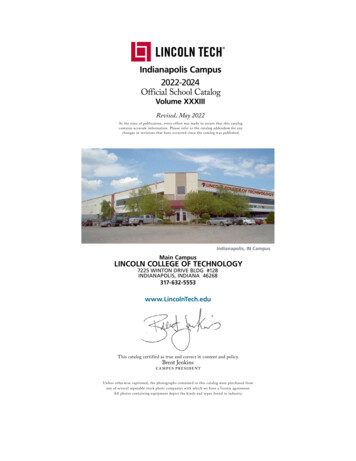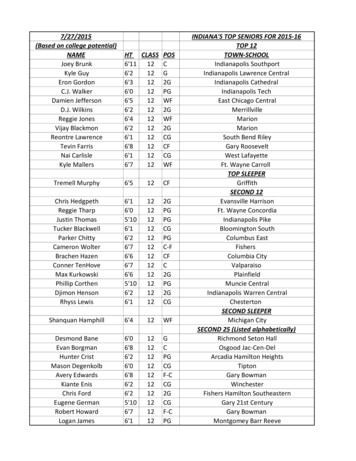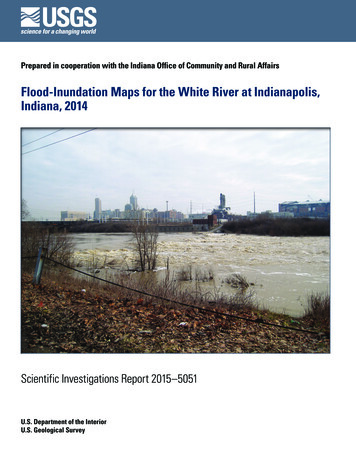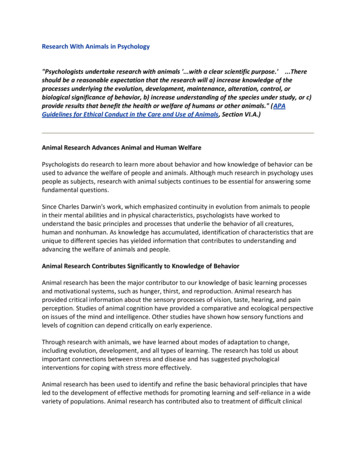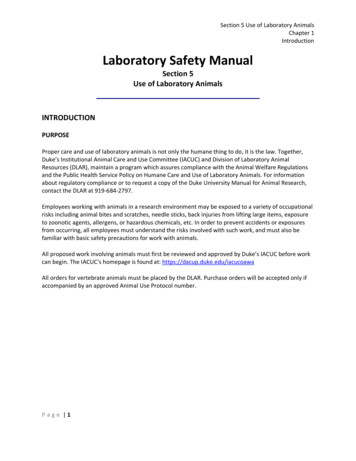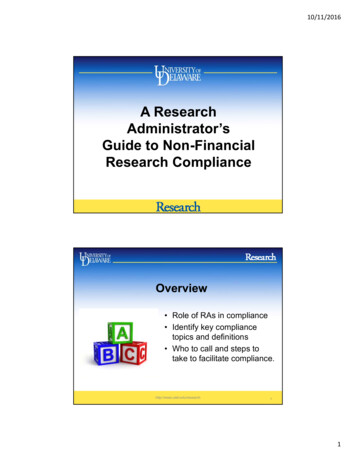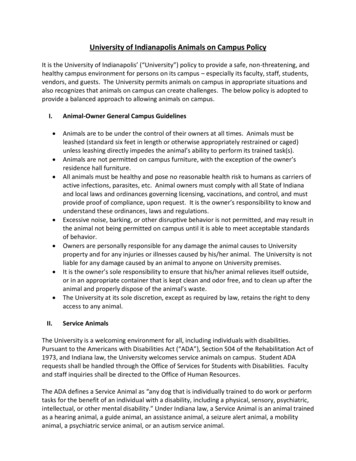
Transcription
University of Indianapolis Animals on Campus PolicyIt is the University of Indianapolis’ (“University”) policy to provide a safe, non-threatening, andhealthy campus environment for persons on its campus – especially its faculty, staff, students,vendors, and guests. The University permits animals on campus in appropriate situations andalso recognizes that animals on campus can create challenges. The below policy is adopted toprovide a balanced approach to allowing animals on campus.I. II.Animal-Owner General Campus GuidelinesAnimals are to be under the control of their owners at all times. Animals must beleashed (standard six feet in length or otherwise appropriately restrained or caged)unless leashing directly impedes the animal’s ability to perform its trained task(s).Animals are not permitted on campus furniture, with the exception of the owner’sresidence hall furniture.All animals must be healthy and pose no reasonable health risk to humans as carriers ofactive infections, parasites, etc. Animal owners must comply with all State of Indianaand local laws and ordinances governing licensing, vaccinations, and control, and mustprovide proof of compliance, upon request. It is the owner’s responsibility to know andunderstand these ordinances, laws and regulations.Excessive noise, barking, or other disruptive behavior is not permitted, and may result inthe animal not being permitted on campus until it is able to meet acceptable standardsof behavior.Owners are personally responsible for any damage the animal causes to Universityproperty and for any injuries or illnesses caused by his/her animal. The University is notliable for any damage caused by an animal to anyone on University premises.It is the owner’s sole responsibility to ensure that his/her animal relieves itself outside,or in an appropriate container that is kept clean and odor free, and to clean up after theanimal and properly dispose of the animal’s waste.The University at its sole discretion, except as required by law, retains the right to denyaccess to any animal.Service AnimalsThe University is a welcoming environment for all, including individuals with disabilities.Pursuant to the Americans with Disabilities Act (“ADA”), Section 504 of the Rehabilitation Act of1973, and Indiana law, the University welcomes service animals on campus. Student ADArequests shall be handled through the Office of Services for Students with Disabilities. Facultyand staff inquiries shall be directed to the Office of Human Resources.The ADA defines a Service Animal as “any dog that is individually trained to do work or performtasks for the benefit of an individual with a disability, including a physical, sensory, psychiatric,intellectual, or other mental disability.” Under Indiana law, a Service Animal is an animal trainedas a hearing animal, a guide animal, an assistance animal, a seizure alert animal, a mobilityanimal, a psychiatric service animal, or an autism service animal.
The service animal must be under the control of the handler at all times and cannot beunattended to disturb others. Complaints about a service animal will be addressed by the Officeof Services for Students with Disabilities.To determine whether an animal is a Service Animal, it must be individually trained to do workor perform tasks for an individual with a disability. Examples of work or tasks include, but arenot limited to, the following: assisting individuals who are blind or have low vision with navigation and othertasks;alerting individuals who are deaf or hard of hearing to the presence of people orsounds;providing non-violent protection or rescue work;pulling a wheelchair;alerting and protecting an individual during a seizure;alerting individuals to the presence of allergens;retrieving items such as medicine or the telephone;providing physical support and assistance with balance and stability to individualswith mobility disabilities; andassisting persons with psychiatric and neurological disabilities by preventing orinterrupting impulsive or destructive behaviors.The crime deterrent effects of an animal’s presence and the provision of emotional support,well-being, comfort, or companionship do not constitute work or tasks for purposes ofdetermining if an animal is a Service Animal under this policy.Section 2.01 Verification of Service AnimalWhen it is not readily apparent that an animal is a Service Animal, the University may inquire ifthe animal is a service animal required because of a disability and what work or task the animalhas been trained to perform.Section 2.02 Care and supervision of Service AnimalThe individual with the disability using a Service Animal is responsible for the care orsupervision of a Service Animal. The Service Animal must be under the control of the individualat all times and must have a harness, leash, or other tether. If the use of a harness, leash, orother tether would interfere with the performance of the work or tasks performed by theService Animal or is impractical because of an individual’s disability, a harness, leash, or othertether may not be required. However, in that case, the individual must be able to control theService Animal by other effective means such as voice controls or signals.A Service Animal is generally permitted to accompany the individual with a disability toUniversity facilities where members of the public, students, staff, and faculty are allowed to go.However, the University may ask the individual with a disability to remove a Service Animal
from any of its facilities if: (1) the Service Animal is out of control and the individual with adisability does not take effective action to control it; or (2) the Service Animal is nothousebroken. The University may also ask the individual with a disability to remove a ServiceAnimal from any of its facilities if the use or presence of the Service Animal poses a directthreat to the health or safety of others or if the animal’s behavior, such as barking, isunreasonably disruptive to the other participants within the facility.The University may impose legitimate safety requirements on the use or presence of a ServiceAnimal that are necessary for safe operation of its facilities. There are some facilities that arenot safe for use or presence of Service Animals and from which the University may excludeService Animals on a case-by-case basis based on actual risks.The individual with a disability must abide by current city, county, and stateordinances/laws/regulations pertaining to licensing, vaccination, and other requirements foranimals.The University will not ask for or require an individual with a disability to pay a surcharge or tocomply with other requirements generally not applicable to people without pets.However, an individual with a disability may be charged any damage caused by his or herService Animal.Section 2.03 Requesting a Service AnimalStudents wishing to utilize a Service Animal on campus should contact the Office of Services forStudents with Disabilities at 317-788-6153. Faculty, staff and visitors wishing to utilize a ServiceAnimal on the campus should contact the Office of Human Resources at 317-788-3998 forapproval.III.Emotional Support AnimalsEmotional Support Animals are animals that provide a sense of safety, companionship orcomfort to individuals with psychiatric or emotional disabilities or conditions. Although theseanimals may provide a therapeutic benefit, they are not considered service animals under theADA or Indiana law. Pursuant to the Fair Housing Act, the University provides reasonableaccommodations for an Emotional Support Animal in University Housing. These animals mustbe contained within the privately assigned student living accommodation (room, suite orapartment, etc.), except to the extent the individual is taking the animal out for natural relief.The Office of Services for Students with Disabilities will determine, on a case by case basis,whether an animal is a reasonable accommodation in University Housing.The following steps must be completed to request this accommodation:o The student must complete the Disability Accommodations in University HousingRequest Form and submit it to the Office of Services for Students with Disabilities.
o The student is responsible for having his/her medical provider complete theAccommodation Verification for Emotional Support Animal Form and have it sent orfaxed to the Office of Services for Students with Disabilities.o Once the Accommodation Verification for Emotional Support Animal Form is received, adecision is made and the student will be notified in writing.IV.PetsPets refer to any animal not otherwise specified as a Service Animal, Service Animal in training,or Emotional Support Animal. The University of Indianapolis is committed to providing anattractive, clean and safe campus for its employees, students, and visitors. To assist in theachievement of these objectives, the University will regulate the presence of pets on campus.For the purpose of this policy, a pet is defined as any domestic animal except fish. ResidenceHall Directors have their own policy administered by Student Affairs.Section 4.01 BuildingsPets are not permitted in any campus building, including all academic, athletic andadministrative buildings, as well as residence halls. Only non-aggressive fish maintained inaquariums (maximum 10 gallon tanks) are permitted in the residence halls. No other animalsare permitted. Failure to comply can result in fines and/or sanctions. AreaCoordinators/Residence Directors have their own policy administered by Student Affairs.Section 4.02 GroundsPets are not allowed in athletic playing venues. Pets in other areas on the campus grounds mustbe leashed and under the control of their owner at all times. All animal excrement must bepicked up by the owner and may only be discarded on campus if it is placed in waste containers.No pets may be tied up outside buildings or left unattended on campus. Stray animals or thoseleft unattended will result in removal by the City of Indianapolis Animal Control Service. Anycosts incurred in the removal or retrieval of a pet will be the owner’s responsibility.Section 4.03 Confinement in VehiclesPets may be confined in vehicles parked on campus for a reasonable period of time, as long asthe animal is not endangered and does not endanger others or create a public nuisance, e.g.excessive barking. In the event of endangerment to the animal or others, the City ofIndianapolis Animal Control Service will be contacted for appropriate action.Section 4.04 EnforcementAll members of the campus community are expected to comply with this policy. The CampusPolice Department is responsible for the enforcement of these regulations. Any questionsregarding the implementation of this policy should be directed to the Campus PoliceDepartment. Failure to comply with this policy and its regulations will be subject to appropriatedisciplinary action.
V.Resolving ConcernsThe University is committed to ensuring the needs of individuals with disabilities are met and toresolving and conflicts or problems as expeditiously as possible. If you are a student and youfeel you were inappropriately denied an accommodation under this policy, a grievance can befiled in writing with the Dean of Students. If you are faculty, staff, or a visitor and you feel youwere inappropriately denied an accommodation under this policy, a grievance can be filed inwriting with the Director of the Office of Human Resources. If you have further questions,please contact the Director of the Office of Services for Students with Disabilities at (317-7886153).
healthy campus environment for persons on its campus - especially its faculty, staff, students, vendors, and guests. The University permits animals on campus in appropriate situations and also recognizes that animals on campus can create challenges. The below policy is adopted to provide a balanced approach to allowing animals on campus.


